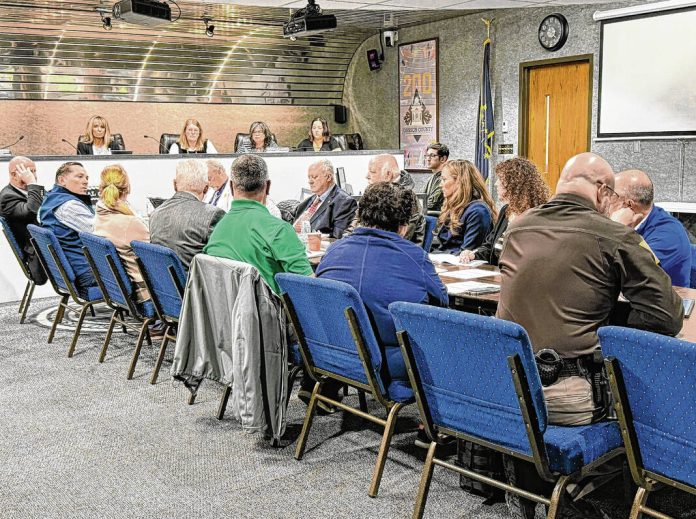After originally saying “no” to local health department funding from the state, the Johnson County Board of Commissioners is officially opting in.
The commissioners voted to opt into funding from the Health First Indiana initiative at their Monday meeting. The county will be eligible to receive approximately $3.1 million in 2025.
Johnson County was one of six counties in the state to turn down the initial round of funding authorized by Senate Enrolled Act 4 of 2023. SEA 4 added $75 million in funding for local health departments for 2024 and $150 million in 2025.
Last year, county officials decided the local health department didn’t need the extra cash or the conditions associated with it and the health department was doing a lot of services that were listed as requirements in the bill already. Officials were also concerned about how the funds’ mandated use percentage would affect the health department’s ability to function, the funding’s sustainability and disparities in funding allocations.
However, after turning the money down, the commissioners received many calls and ultimately decided to reconsider after holding a roundtable with state officials in March. In a presentation by officials from the Indiana Department of Health, county officials learned how the funds’ use could be flexible and would benefit the county much more than they previously had thought.
Funds from the HFI initiative will be used for the county health department’s chronic disease prevention, tobacco and vaping prevention and cessation, and trauma and injury programs. It will also be used for maternal and child health, environmental public health, the department’s school liaison program and “access to and linkage to care” programs — like an after-hours health clinic for under-served populations, Swearingen said when presenting a proposed budget for the funding to the commissioners earlier this month.
One program Swearingen is most excited about is the potential for the health department to give out grants for programs that would benefit citizens, she said.
“It’ll be very interesting to see who comes to us to ask us for things that they think that they need in the county,” Swearingen said in May. “People who are out there every day … who need the funding and can’t find the funding; and that will better serve our citizens.”
HFI funds could also be used to give aid to surrounding counties, like Brown County, which are smaller and may not get as much funding from the state, Swearingen said. Counties like Brown could partner with Johnson County on programs they cannot normally afford to put on by themselves, she said.
There are fewer regulations for the HFI funds compared to other grants the county health department typically gets. That provides more freedom to allocate it to needed areas, Swearingen said.
One new position will need to be added: a grant manager. This role, which would be paid for with the funds, would manage the proposed grant program, along with the department’s other needs, she said.
The county would not lose any of its other health grants by opting into the program, though one position would be moved into the HFI fund. The grant for the school liaison position will be done, and the state wanted it moved under HFI which could also be a use for the funding, Swearingen said.
If the state legislature chooses not to fund HFI past its current two-year budget, the health department could cover the positions for at least five years with other funds, Swearingen said.
“We’re not a health department that needs these funds to do what we’re already doing,” she said in May. “These funds would just be to build and to grow and to do other projects outside what we’re already doing.”
With the funding approved, the commissioners are hopeful the money will be put to good use with minimal hiccups.
“I just do want to say that I don’t think my warnings are over yet,” said Commissioner Brian Baird at Monday’s meeting. “Hopefully, this will go seamlessly and smoothly without any strings that come up later … I appreciate everything, I appreciate Dr. Weaver coming down and having that discussion with us, and Ron putting that public forum together. I think that was very valuable for us and all the citizens.”





